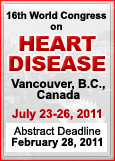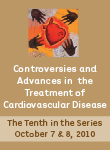|




| |
Studies describe
heart disease following smallpox vaccination |
November 10, 2003
ORLANDO, FL (AHA)
–
Heart-related
complications can occur after the smallpox vaccine, but symptoms
are usually mild, according to three studies presented at the
American Heart Association’s Scientific Sessions 2003.
The rate of adverse cardiac events was about 58 per 100,000
vaccinations in data collected between January and May 2003,
said Richard Schieber, M.D., of the Smallpox Vaccine Adverse
Events Monitoring and Response Activity, National Immunization
Program at the Centers for Disease Control and Prevention (CDC)
in Atlanta, Ga.
Twenty-four cases of pericarditis, myocarditis, dilated
cardiomyopathy or acute coronary syndromes (heart attack or
chest pain known as angina) were identified among 37,876 U.S.
civilian healthcare workers vaccinated as part of the nation’s
bioterrorism readiness program. Twenty-two patients had
pericarditis or myocarditis.
Pericarditis is inflammation of the pericardium, the thin sac
(membrane) that surrounds the heart and the roots of the great
blood vessels. Chest pain is one of the first signs.
Myocarditis is inflammation of the heart muscle caused by
conditions such as infection, rheumatic fever, diphtheria,
tuberculosis or toxic drug poisoning.
The average interval from vaccination to illness was about 12
days. Most patients with myocarditis had a mild form of the
disease, but two of eight patients with acute coronary syndromes
died suddenly within three weeks after vaccination.
Five of the eight had three or more risk factors for, or a
history of, coronary artery disease before vaccination.
In a large population in the same age range, some acute
coronary events will occur over several weeks even in the
absence of any identifiable cause, Schieber said.
Public health officials expected some adverse reactions
associated with the smallpox program, but didn’t anticipate
heart complications, he said.
“As the civilian vaccination program unfolded, we received
reports about cardiac complications among the military personnel
in December, in addition to some apparent cases of myocarditis
and pericarditis,” he said. “Since the deaths occurred soon
after the vaccinations, the CDC convened an emergency meeting to
review the data and determine if changes were needed in the
vaccine program.”
“While we couldn’t determine a direct causal link between the
vaccine and the acute coronary syndrome, the CDC did recommend
that anyone who has three of these five known heart disease risk
factors — high blood pressure, high cholesterol, diabetes, a
family history of heart disease or cigarette smoking — should
not be vaccinated.”
John Murphy, M.D., a cardiologist at the Mayo Clinic in
Rochester, Minn., studied 18 cases of myocarditis or
pericarditis among 230,000 military personnel.
“That’s an incidence of about one case per 12,700 vaccinees,”
Murphy said.
In the third study, Gregory K. Bruce, M.D., reported biopsy
results from one of those 18 cases. The 29-year-old soldier was
admitted to the hospital with shortness of breath two weeks
after he received his smallpox vaccination. He also had
elevated cardiac troponin levels, which indicates heart muscle
damage, and high C-reactive protein levels, which indicates
inflammation.
Myocarditis was confirmed with a biopsy. After he was
diagnosed, further tests suggested that his heart muscle injury
was caused by an immune system response to the initial
vaccination.
“The smallpox vaccine appears to be associated with
myocarditis and pericarditis, but so far disease has been mild
in civilians who received the vaccine,” Schieber said.
The relationship between the vaccine and acute coronary
syndromes or heart attacks is still not clear, he said.
In a statement regarding the first ischemic heart disease
complications that occurred after vaccinations began, the
American Heart Association said, “In the past, cardiac
complications after smallpox vaccination have been rare, but the
majority of individuals undergoing vaccination in previous
programs were children or young adults at low risk for
underlying heart disease. Now that a large number of adults are
receiving the vaccine, especially those in middle age who may
have underlying heart disease, it will be important to carefully
and continuously monitor the situation.”
The American Heart Association urges people who have been
vaccinated for smallpox to be aware of the symptoms of
pericarditis, myocarditis and acute coronary syndromes and to
contact their healthcare provider with any concern about their
heart health. These symptoms may include chest pain or
discomfort, palpitations, shortness of breath, ankle swelling,
and/or unusual fatigue.
Schieber’s co-authors are Juliett Morgan; Martha H. Roper;
Linda Neff; Louisa Chapman; John Iskander; Gina Mootry; Laurence
Sperling; Rose Marie Robertson and David Swerdlow.
Murphy and Bruce’s co-authors are Scott Wright; Keith Bruce;
James Riddle; William D. Edwards; Larry M. Baddour and Leslie T.
Cooper. |
|
|
|